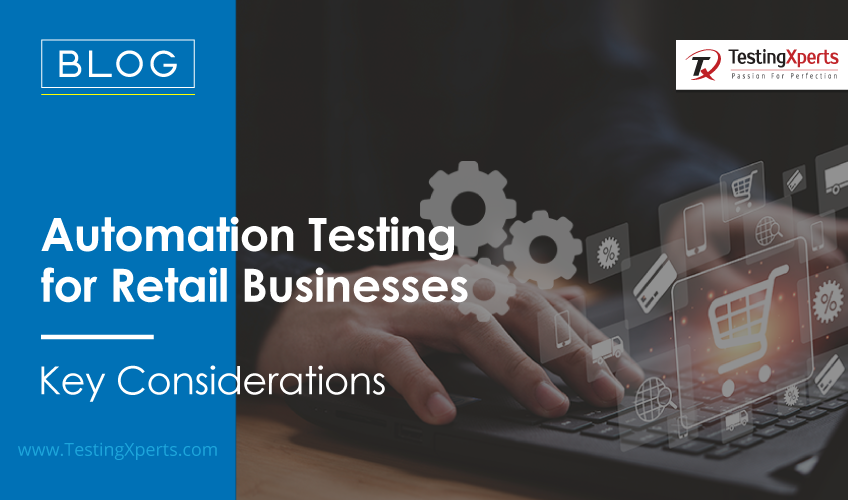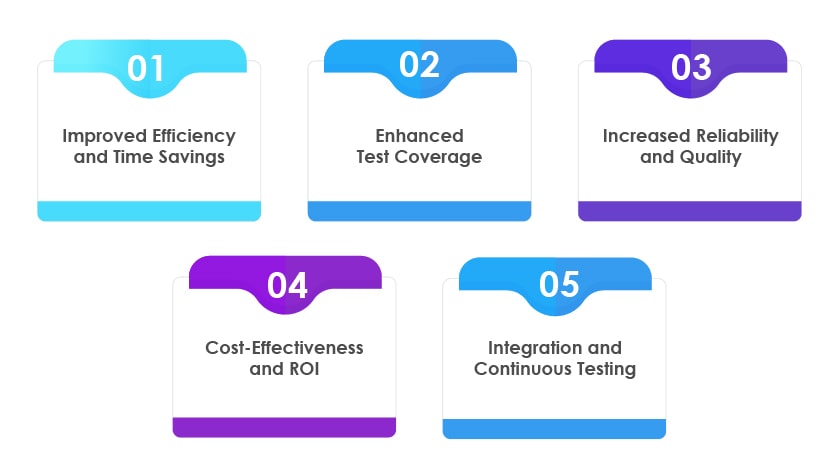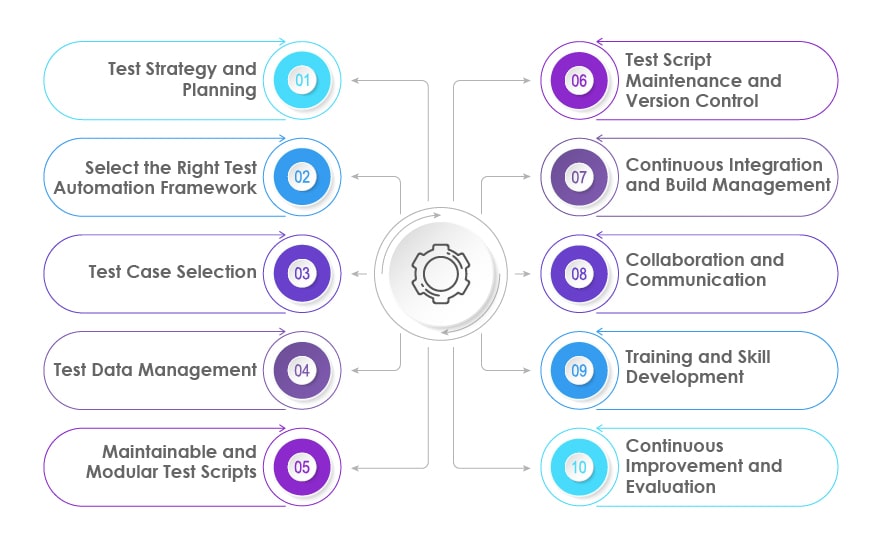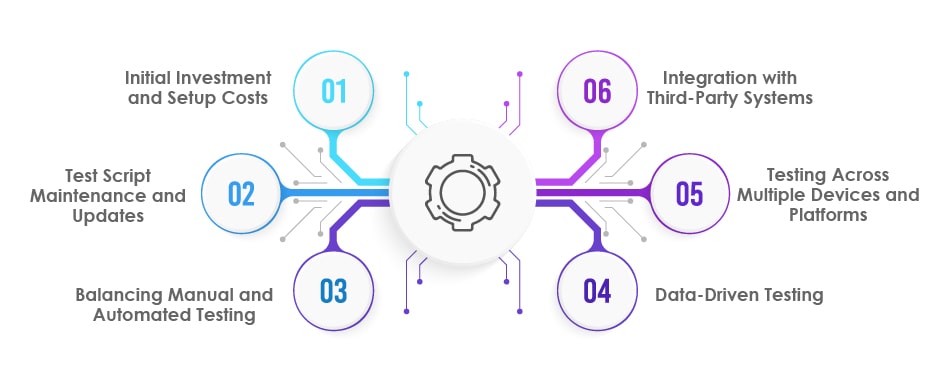Recommended Blogs
Automation Testing for Retail Businesses – Key Considerations

In the ever-evolving landscape of the retail industry, staying ahead of the competition requires businesses to continually innovate and deliver exceptional customer experiences. One crucial aspect of achieving this goal is ensuring the quality and reliability of software applications that power various retail operations. Automation testing has emerged as a game-changer, offering a multitude of benefits for retail businesses seeking to streamline their testing processes and enhance overall efficiency.
The retail industry is undergoing a rapid digital transformation, with online sales projected to reach a staggering $6.54 trillion by 2023, as stated in a report by ABC Analytics. With such exponential growth and increased customer expectations, automation testing has become an indispensable tool for retail businesses looking to deliver seamless, error-free digital experiences.
In this blog post, we will delve into the significant benefits of automation testing for retail businesses. From improving efficiency and saving time to enhancing test coverage and ensuring the reliability of software applications, we will explore how automation testing can help retailers gain a competitive edge in today’s dynamic marketplace.
Let’s dive in and discover why automation testing is a must-have for retail businesses striving for success.
What are the Benefits of Automation Testing for Retail businesses?

Improved Efficiency and Time Savings:
Automation testing allows retail businesses to accelerate their testing processes by executing test cases quickly and efficiently. It eliminates the need for repetitive manual testing, saving significant time and effort. With automation, testing can be performed simultaneously on multiple devices, browsers, and platforms, enabling faster releases and reducing time-to-market.
Enhanced Test Coverage:
Automation testing enables comprehensive test coverage across various retail channels, such as websites, mobile apps, and point-of-sale systems. It can handle a large number of test cases, scenarios, and configurations, ensuring that all critical functionalities are thoroughly tested. This broader coverage reduces the risk of undetected issues and enhances the overall quality of the software.
Increased Reliability and Quality:
Automation testing eliminates human errors and inconsistencies that may occur in manual testing. It ensures that software applications in the retail industry perform seamlessly across different platforms, browsers, and devices. By identifying and resolving issues early in the development cycle, automation testing helps deliver a reliable product with improved user experience, leading to higher customer satisfaction and loyalty.
Cost-Effectiveness and ROI:
While the initial investment in setting up automation testing may be higher, it proves to be cost-effective in the long run. Automation reduces the need for a large testing team and minimizes manual testing efforts. It saves costs associated with manual testing resources, including time, labor, and infrastructure. Moreover, automation testing helps prevent revenue loss due to software failures, making it a sound investment with a positive return on investment (ROI).
Integration and Continuous Testing:
Automation testing can be seamlessly integrated into the development workflow, enabling continuous testing in agile environments. By automating regression tests and incorporating continuous integration and continuous delivery (CI/CD) practices, retail businesses can release software updates more frequently, with confidence in the quality and stability of their applications. Real-time feedback from automated tests also enables faster bug fixing and facilitates collaboration between development and testing teams.
What are the Best Practices for Implementing Automation Testing?

Test Strategy and Planning:
Develop a comprehensive test strategy and plan that outlines the objectives, scope, and approach for automation testing. Define clear goals, identify the critical functionalities to be automated, and prioritize test cases based on risk and business impact.
Select the Right Test Automation Framework:
Choose an appropriate test automation framework that aligns with your technology stack, application architecture, and testing requirements. Consider factors such as ease of use, scalability, maintenance, and integration capabilities. Popular frameworks include Selenium, Appium, and Robot Framework.
Test Case Selection:
Prioritize test cases that are well-suited for automation. Start with stable and repeatable test cases that cover core functionalities and critical workflows. Consider the complexity, frequency of execution, and business value of the test cases to maximize the return on investment (ROI) of automation testing.
Test Data Management:
Ensure effective management of test data for automation testing. Use real-world, representative data sets that simulate various scenarios. Create test data repositories or leverage data generation tools to generate test data efficiently. Maintain data integrity and ensure data privacy and security.
Maintainable and Modular Test Scripts:
Design test scripts that are modular, maintainable, and reusable. Use programming concepts like functions, classes, and libraries to create a structured and scalable test automation framework. Implement separation of concerns to enhance script readability and ease of maintenance.
Test Script Maintenance and Version Control:
Establish a robust test script maintenance process. Regularly review and update test scripts to reflect application changes and new test scenarios. Utilize version control systems like Git to manage test scripts, track changes, and collaborate effectively across the testing team.
Continuous Integration and Build Management:
Integrate automation testing with continuous integration and build management systems. Configure automated tests to trigger with each build, ensuring regular and frequent testing. Monitor test results and report failures promptly to enable quick resolution.
Collaboration and Communication:
Foster collaboration and communication between the development and testing teams. Establish clear channels for sharing feedback, bug reports, and test results. Regularly communicate with stakeholders to ensure alignment on test automation objectives, progress, and outcomes.
Training and Skill Development:
Invest in training and skill development for the testing team members involved in automation testing. Provide them with the necessary tools, resources, and training programs to enhance their automation testing skills. Stay updated with the latest automation testing trends, frameworks, and tools.
Continuous Improvement and Evaluation:
Continuously evaluate the effectiveness of automation testing efforts. Analyze test results, identify areas for improvement, and refine the automation strategy and test coverage. Seek feedback from the testing team and stakeholders to drive continuous improvement in the automation testing process.
What are the challenges and considerations to implement test automation for retail business?

Initial Investment and Setup Costs:
Implementing test automation for retail businesses requires an initial investment in infrastructure, tools, and resources. The costs associated with setting up the automation framework, acquiring licenses for automation tools, and training/testing resources can be a challenge, especially for small and medium-sized retail businesses.
Test Script Maintenance and Updates:
Test automation requires ongoing maintenance and updates as the application evolves. Retail businesses often introduce frequent changes in their software due to updates, new features, or changes in business requirements. Ensuring that test scripts are updated to reflect these changes and maintaining synchronization between application changes and test scripts can be a significant challenge.
Balancing Manual and Automated Testing:
While automation testing brings efficiency and scalability, there are scenarios where manual testing is still necessary. Certain test scenarios, such as visual and usability testing, may be more challenging to automate. Finding the right balance between manual and automated testing is crucial to ensure comprehensive coverage and accurate test results.
Data-Driven Testing:
Retail businesses often deal with a large volume of data, such as product catalogs, inventory information, and customer data. Designing and managing data-driven tests that cover various data scenarios can be complex. Ensuring the accuracy and availability of test data for automation can pose challenges.
Testing Across Multiple Devices and Platforms:
Retail applications need to be compatible with various devices (desktops, mobiles, tablets) and platforms (Windows, iOS, Android). Testing across multiple configurations, screen sizes, and operating systems requires additional effort and resources to set up and maintain a comprehensive test environment.
Integration with Third-Party Systems:
Retail businesses often integrate their software with third-party systems, such as payment gateways, inventory management systems, and customer relationship management (CRM) tools. Testing the integration points and ensuring seamless interoperability between the application and these systems can be complex and time-consuming.
Addressing these challenges requires careful planning, allocation of resources, and ongoing collaboration between the testing, development, and business teams. By recognizing these considerations, retail businesses can proactively overcome hurdles and achieve successful test automation implementation.
Conclusion
Automation testing is a game-changer for retail businesses, providing improved efficiency, enhanced test coverage, increased reliability, cost-effectiveness, and integration with agile practices. By investing in automation testing and embracing it as an integral part of their software development lifecycle, retail businesses can deliver high-quality applications, foster customer satisfaction, and stay competitive in the rapidly evolving retail landscape.
Why Choose Tx for Automation Testing of your Retail Business?
Tx has a deep expertise in the retail domain and tailored solutions, We understand the unique challenges faced by retail businesses and provides comprehensive retail testing services. TestingXperts proven track record of successful implementations, helping retail clients achieve improved software quality, enhanced efficiency, and cost savings. TestingXperts utilizes industry-leading tools and frameworks, staying updated with the latest trends to provide cutting-edge automation solutions. Our end-to-end test automation approach ensures thorough testing of various retail applications, including websites, mobile apps, and point-of-sale systems. By partnering with TestingXperts, you can benefit from our extensive experience, domain knowledge, and commitment to delivering high-quality automation testing services for your retail business.
FAQs
Retail applications manage high transaction volumes, dynamic pricing, and real-time inventory changes. Automation ensures seamless performance, prevents checkout failures, and enhances security. It accelerates regression testing and helps businesses stabilize digital platforms during peak hours.
Automation optimizes website performance, ensures fast page loads, and prevents glitches in payment processing. It also enables real-time testing of UI/UX elements, ensures seamless mobile responsiveness, and validates personalized recommendations.
Selenium, Appium, and Cypress are popular for functional and cross-browser testing, while Tricentis Tosca supports scriptless automation. AI-driven solutions further enhance test efficiency by predicting and self-healing test failures.
Retail businesses struggle with frequent UI changes, complex integrations with third-party systems, and maintaining test stability across platforms. A strategic automation framework would help mitigate these barriers.
Discover more
